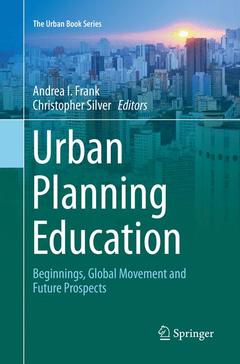Description
Urban Planning Education, Softcover reprint of the original 1st ed. 2018
Beginnings, Global Movement and Future Prospects
The Urban Book Series
Coordinators: Frank Andrea I., Silver Christopher
Language: English
Subjects for Urban Planning Education:
Publication date: 05-2018
Support: Print on demand
Publication date: 07-2017
Support: Print on demand
Description
/li>Contents
/li>Biography
/li>Comment
/li>
This book examines planning education provision and approaches globally, through a comparative and longitudinal perspective. It explores the emergence of planning education in the 20th century, with its rich variation and yet a remarkable degree of cross-fertilization. Each of the sections of the book is framed by an overview essay which has been prepared by the editors to provide the reader with a critical exposure to relevant scholarship drawing on the detailed case studies and exploratory essays on key issues in planning education.
The first part of this volume focuses on the emergence of planning education programs in the twentieth century as a way to understand the current planning education environment. Then we explore how education in urban, regional and spatial planning has developed in different ways in different countries and continents. The final part of this volume aims to envision how planning can adapt and develop to remain relevant to the development of human environments in the 21st century.Urban planning education has become a pervasive practice throughout the world as urbanization and development pressures have increased over the past half century, and as demand increased for professional trained experts to guide those processes. The approaches vary widely, based in part upon the discipline from which the planning program developed as well as the context-specific challenges within the country or region where the program resides.
Introduction.- Section I – Beginnings.- The origins of planning education: overview.- The department of civic design at Liverpool university and its lever professors: influence and wider legacies.- Educating planners at MIT: eight decades of changing cities.- Jaqueline Tyrwhitt and the internationalization of planning education.- Six decades of planning education in China: those planned and unplanned.- Tertiary education and post-war reconstruction: the first Australian planning programs.- Planning education in Brazil.- Section II – Emerging global movement.- Adapting, shifting, defining new roles: education for a maturing professional field.- Partnerships in planning education: the association of African planning schools (AAPS).- Planning paradigm shift in the era of transition from urban development to management: the case of Korea.- Development of planning education in post-communist Poland.- Advancing education for planning professionals in Estonia – Between new qualities
and path-dependency.- Planning education in Bangladesh.- The roles of planning education in the decentralization & democratization era: lessons from Indonesia.- Section III – charting future trends.- Envisioning the future of planning and planning education.- Educational partnerships for innovation in communities (EPIC): harnessing university resources to create change.- The collaborative interdisciplinary studio.- Planning education with and through technologies.- Educating code-switchers in a post-sustainability world.- Are planning programs delivering what planning students need? perspectives on planning education from practitioners.- Conclusion.Andrea I Frank is a Senior Lecturer at the School of Geography and Planning at Cardiff University with teaching expertise in physical planning, graphic presentation, urban design studio, comparative international planning and public participation in plan-making amongst others. Andrea has been awarded Senior Fellow of the UK Higher Education Academy in acknowledgement of her engagement and competencies in pedagogy in Built Environment disciplines. As subject coordinator and co-director of the Centre for Education of the Built Environment (CEBE) from 2000 – 2011, she has run numerous workshops, organized conferences, published and conducted research on topics such as work-based learning, creative problem-solving, internationalization, employability, and entrepreneurship. From 2007 – 2013 she has served on the Association of European Schools of Planning Executive Board and on AESOP’s Excellence in Teaching and Learning Prize jury. She has co-chaired with fellow co-editor Christopher Silver the council of the Global Planning Education Association Network.
Christopher Silver, FAICP is Professor of Urban and Regional Planning at the University of Florida, whose areas of teaching include international development planning, planning history and sustainable urbanism. He also has held academic and administrative appointments at Virginia Commonwealth University from 1979 to 1998 and the University of Illinois, 1998-2006. He served for three years as urban development advisor to Indonesia under a U.S. Agency for International Development project. His international experience in Indonesia began in 1989 with a Fulbright Senior Lectureship at the University of Indonesia, and continued with two subsequent Fulbright scholarships in 1992 and 2004 at the Institute of Technology Bandung, Indonesia. He has spent over 20 years researching urban development and decentralization in that country. He is author or co-author of five books, including Planning the Megacity




